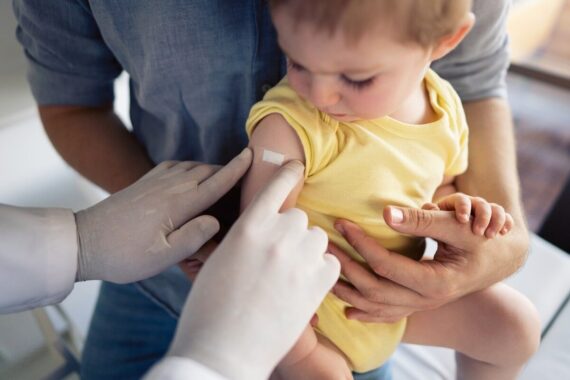The Joint Committee on Vaccination and Immunisation (JCVI) has recommended that a universal chickenpox vaccination programme is included in the routine childhood schedule.
The programme would use the combined measles, mumps, rubella and varicella (MMRV) vaccine and would include two doses at 12 and 18 months of age.
This recommendation is based on evidence from other countries showing that a 2-dose schedule including varicella can reduce the number of chickenpox cases ‘rapidly and dramatically’.
The JCVI has also recommended that a catch-up programme begins after implementation.
Around half of children have had varicella by the time they are four years old, and around 90% have had it by 10, according to Government data.
But the JCVI has highlighted that reduced social mixing during the pandemic has meant that there is now a ‘larger pool’ of susceptible children.
Varicella is very common among children, but is often more serious in infants under four weeks and adults, particularly pregnant women and those who are immunosuppressed.
In its recommendation, the committee cited a hospital surveillance study which found that ‘complications from severe varicella were common, costly and placed a burden on health services’.
Using combined MMRV vaccine as a first dose has been associated with a ‘slightly increased’ risk of febrile seizures compared to using the varicella-only vaccine and separate MMR vaccine.
However, the JCVI has recommended the combined MMRV product since it means fewer injections are needed each time a child comes in – studies have shown this is in line with parent preference.
The recommendation also said: ‘Due to the larger pool of varicella-susceptible children following the pandemic restrictions and, as vaccination is predicted to significantly decrease circulation of varicella, susceptible people may continue to be vulnerable to catching varicella as they head into adulthood.
‘Therefore, the committee considered that it would be beneficial to ensure that a catch-up programme is implemented to prevent a gap in immunity.’
Previously, the JCVI had decided against recommending a universal varicella vaccination programme, in part due to concerns that it could lead to an increase in cases of shingles (herpes zoster) in middle-aged adults, since exposure to varicella boosts shingles immunity.
However, updated evidence reviewed by the committee over the last year has shown that a chickenpox vaccination programme is unlikely to increase shingles incidence and the immunity gained from exposure to circulating chickenpox is much shorter than previously predicted.
Professor Helen Bedford, professor of children’s heath at the Great Ormond Street Institute of Child Health, said providing a varicella vaccine to all children would be a ‘welcome addition’ to the UK’s vaccination programme, as chickenpox can ‘result in serious complications such as nasty bacterial skin infections, pneumonia and inflammation of the brain’.
Dr Michael Absoud, adjunct reader at King’s College London’s Department of Women and Children’s Health, said: ‘This is very good news for child health in the UK, and based on an extensive evidence review from the JCVI. The programme will prevent severe cases of chicken pox and associated rare but significant complications.
‘The JCVI reviewed data on disease burden, real world experience and health economic modelling to ensure cost-effectiveness of the programme.’
In September, the UK Health Security Agency said it was seriously concerned about an ongoing downward trend in childhood vaccines uptake – annual figures showed from the last financial year showed falling uptake of between 0.1 and 0.2 percentage points across 12 of 14 measures.
And last week, GPs in England were asked to participate in a catch-up campaign for MMR vaccines after public health officials warned of rising cases of measles.

















No more chickenpox parties then?
Oh but more money for big pharma.
No chicken pox so no shingles in future generation.
Are they really inferring, yet again, that lock downs are the reason that more kids are getting chicken pox? Not the well documented and proven reduced immunity that is the sequelae of repeated covid infection? Most developed countries have been vaccinationg against chicken pox for a while because it reduces the burden of shingles as well as reducing death and disability in babies born to mums who have had chicken pox while pregnant. This should have been done a long long time ago.
I can remember my 6 year old contracting chickenpox over 20 years ago while we were in the USA. The locals found the fact that we did not vaccinate unbelievable. I was unable to explain why we chose not to as a country. I wonder why common sense has only just prevailed
Might there be increased risk if the population is partially vaccinated? Since covid, many parents are increasingly sceptical about immunisation, will uptake be high enough? Or will a proportion be unprotected but less frequently exposed, potentially at greater risk from infection at an older age?